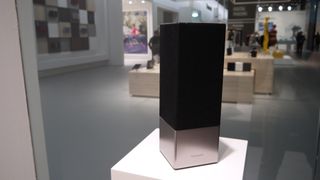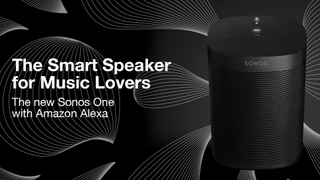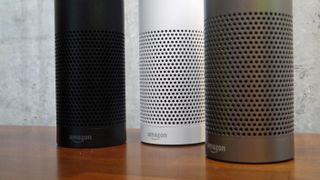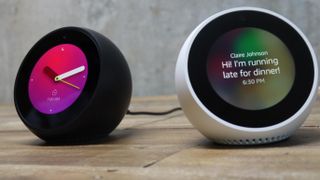[ad_1]
A few short months ago I thought I knew where the world of smart speakers was heading. I made bold claims about how Amazon’s Echo hardware was on the verge of redundancy now that a host of third-party manufacturers were rushing to produce Alexa speakers of their own.
Now, though, after a couple of weeks that have included a host of new announcements by both Amazon and Google, I’m not so sure.
Although my previous prediction looks a little crazy in retrospect, at the time I’d just walked out of a meeting with chip-maker Qualcomm where their representatives had proudly shown off some tech that would make it far easier for third-party manufacturers to equip their devices with voice assistants.
Even Amazon was getting in on the action by opening up the microphone tech behind its Echo speakers.
Not to be left behind, Google also got in on the third-party action.
Everyone seemed to be preparing themselves for a tidal wave of Alexa and Google Assistant speakers as manufacturers rushed to tick this newest of feature boxes.

The Panasonic SC-GA10 is one such third-party speaker that’s packing Google Assistant.
At the time it felt like the point of Amazon and Google’s own devices had been downgraded. They seemed to have been downgraded into something that was just meant to get the voice assistants into people’s homes, at which point Amazon and Google could take a step back and let other people manufacture the hardware.
The two giants could then focus its efforts on the software in much the same way as Google did with Android in the pre-Pixel era.
This tactic had been working surprisingly well. I saw numerous manufacturers rush to include either Alexa or Google Assistant in their new speakers at IFA, and just last week Sonos debuted the Sonos One, an Alexa-packing multi-room speaker.
Even EcoBee built the assistant into the fourth generation of its smart thermostat.

The Sonos One comes packing Alexa.
And then the last two weeks happened
Then we saw a whole host of new first-party announced over the past two weeks.
Amazon was first with its surprised Seattle event in which it announced an abundance of Echo devices. These included a new version of the base Amazon Echo, an enhanced Amazon Echo Plus, and a miniature screen-equipped Amazon Echo Spot.
Then, at its big Pixel 2 launch event earlier this week, Google followed Amazon’s lead and announced two new first-party Google Assistant speakers, the Google Home Mini and Google Home Max.
Its clear that neither Amazon nor Google have any intention to retire from the hardware race just yet.

Amazon’s Echo Plus shows the company has no plans to give up on its own hardware anytime soon.
Where do we go from here?
Now that my previous theory about Google and Amazon stepping back from hardware has been proved wrong (thanks for that guys), where do we go from here?
It seems obvious that Google and Amazon intend to take a Pixel-esque approach to their hardware where they control the ecosystem while also producing the flagship hardware to show other manufacturers how it’s done.
But the direction of this new generation of screen-equipped devices is a lot harder to pin down, especially now that Google is rumored to be joining Amazon with a screen-equipped device of its own.
Maybe third-party manufacturers will be given the ability to make screen-toting voice assistant devices of their own? Could we be about to see an army of Spot-style speakers from Amazon’s third-party partners?

Could we see screen-equipped devices from companies other than Amazon in the future?
But then again, maybe part of its plan to produce the flagship Alexa devices means Amazon will want to keep screens as an exclusive feature for itself. Other manufacturers can make smart speakers of their own, but for the full experience you’re going to have to go to Amazon.
At the moment, I’m leaning towards the latter, at least until we get firmer news on Google’s screen-equipped offering. You’ll still be able to have everything in your house listen to you, but for the premium experience you’re going to want to buy one of Amazon’s own devices.
Really though, it’s still early in the war for controlling the smart home. Whoever eventually does win, though, will reap the benefits for years to come.
- Be sure to keep an eye out on Black Friday where Amazon is sure to lead the way on discounts for its Echo devices. Our Amazon Black Friday deals page will play host to all the company’s best deals.
[ad_2]
Source link
